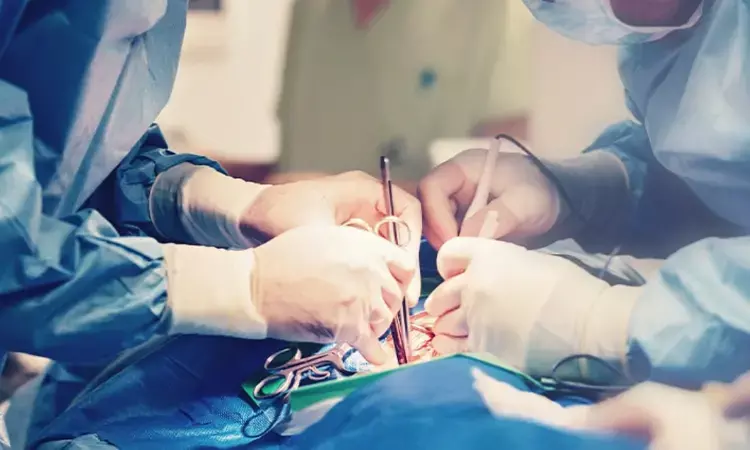- Home
- Medical news & Guidelines
- Anesthesiology
- Cardiology and CTVS
- Critical Care
- Dentistry
- Dermatology
- Diabetes and Endocrinology
- ENT
- Gastroenterology
- Medicine
- Nephrology
- Neurology
- Obstretics-Gynaecology
- Oncology
- Ophthalmology
- Orthopaedics
- Pediatrics-Neonatology
- Psychiatry
- Pulmonology
- Radiology
- Surgery
- Urology
- Laboratory Medicine
- Diet
- Nursing
- Paramedical
- Physiotherapy
- Health news
- Fact Check
- Bone Health Fact Check
- Brain Health Fact Check
- Cancer Related Fact Check
- Child Care Fact Check
- Dental and oral health fact check
- Diabetes and metabolic health fact check
- Diet and Nutrition Fact Check
- Eye and ENT Care Fact Check
- Fitness fact check
- Gut health fact check
- Heart health fact check
- Kidney health fact check
- Medical education fact check
- Men's health fact check
- Respiratory fact check
- Skin and hair care fact check
- Vaccine and Immunization fact check
- Women's health fact check
- AYUSH
- State News
- Andaman and Nicobar Islands
- Andhra Pradesh
- Arunachal Pradesh
- Assam
- Bihar
- Chandigarh
- Chattisgarh
- Dadra and Nagar Haveli
- Daman and Diu
- Delhi
- Goa
- Gujarat
- Haryana
- Himachal Pradesh
- Jammu & Kashmir
- Jharkhand
- Karnataka
- Kerala
- Ladakh
- Lakshadweep
- Madhya Pradesh
- Maharashtra
- Manipur
- Meghalaya
- Mizoram
- Nagaland
- Odisha
- Puducherry
- Punjab
- Rajasthan
- Sikkim
- Tamil Nadu
- Telangana
- Tripura
- Uttar Pradesh
- Uttrakhand
- West Bengal
- Medical Education
- Industry
Caudal block anesthesia not tied to increased surgical complications after hypospadias surgery: Study

Iran: Farshid Alizadeh's recent study found that using caudal block anesthesia instead of general anesthetic did not increase surgical problems, approving the Caudal epidural block (CEB) protocol as a safe approach in hypospadias treatment. The findings of this study were published in the Journal of Pediatric Urology on 19th November 2021.
CEB offers the advantage of lowering post-operative discomfort and maybe intra-operative hemorrhage in hypospadias surgery. However, some research has revealed that this method may raise the risk of post-operative problems. Therefore researchers performed this study to compare the complication rates of individuals who received CEB following hypospadias surgery vs those who did not.
This double-blind randomized controlled experiment was carried out on boys aged 6 to 35 months who had hypospadias correction surgery in a university hospital between March 2018 and March 2019.
The setup of the study was as follows:
- Sixty patients were randomly assigned to one of two groups (group A: 31 and group B: 29).
- CEB was conducted on group B with 0.5 mg/Kg of 0.125 percent bupivacaine (Marcaine).
- Six months following surgery, postoperative problems such as fistula, meatal stenosis, dehiscence, and bleeding were evaluated.
The results of the study were as stated; at 24 hours, one week, one, three, and six months after surgery, the patients were evaluated for potential problems. There were no significant variations in the frequency of dehiscence, fistula, and meatal stenosis between the two groups of patients. Furthermore, there was no statistically significant difference in complication rates between patients with proximal and distal hypospadias.2
The researchers concluded, the current study showed that the use of caudal block anesthesia in comparison with general anesthesia did not increase surgical complications, which approved CEB protocol as a safe method in hypospadias repair.
Reference:
Alizadeh, F., Amraei, M., Haghdani, S., & Honarmand, A. (2021). The effect of caudal epidural block on the surgical complications of hypospadias repair in children aged 6 to 35 months: A randomized controlled trial. In Journal of Pediatric Urology. Elsevier BV. https://doi.org/10.1016/j.jpurol.2021.11.009
Medical Dialogues consists of a team of passionate medical/scientific writers, led by doctors and healthcare researchers. Our team efforts to bring you updated and timely news about the important happenings of the medical and healthcare sector. Our editorial team can be reached at editorial@medicaldialogues.in.
Dr Kamal Kant Kohli-MBBS, DTCD- a chest specialist with more than 30 years of practice and a flair for writing clinical articles, Dr Kamal Kant Kohli joined Medical Dialogues as a Chief Editor of Medical News. Besides writing articles, as an editor, he proofreads and verifies all the medical content published on Medical Dialogues including those coming from journals, studies,medical conferences,guidelines etc. Email: drkohli@medicaldialogues.in. Contact no. 011-43720751


